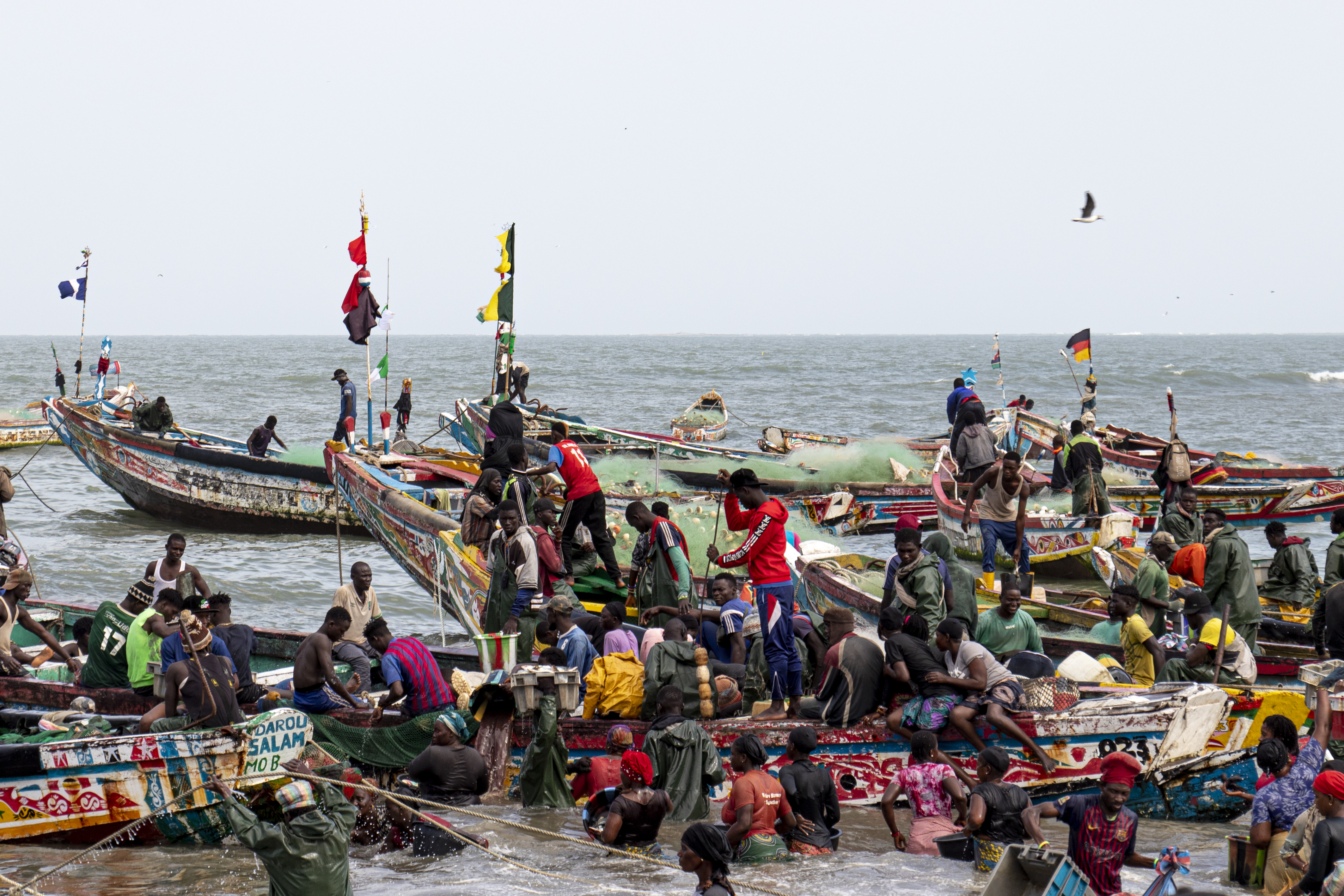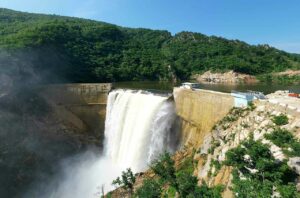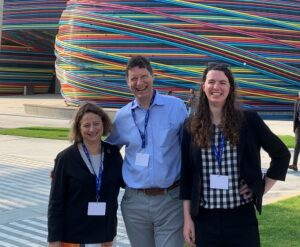Executive Summary
West African countries and the People’s Republic of China (PRC) share a deep mutual interest in supporting the development of sustainable fisheries management throughout West Africa to ensure long-term economic, food, and environmental security in both regions of the world. To support these goals, the Stimson Center coordinated a comprehensive review of illegal, unreported, and unregulated (IUU) fishing, fisheries management, and the role of the PRC in the development of West Africa’s sustainable blue economy.
To complete this extensive body of work, the Stimson Center and its partners performed desk research, conducting over 40 hours of interviews with leading experts, including academia, journalism, local and international non-governmental organizations (NGO), and civil society stakeholders. Areas of expertise included fisheries, journalism, and a cross-section of sustainable blue economy industries from West Africa and the PRC. The project culminated with a convening of civil society stakeholders from both West Africa and the PRC for a series of Track II and Track 1.5 dialogues. The goal of this expansive effort was to better understand how West Africa and the PRC’s fisheries interests and experiences converge, differ, and where more work and cooperation is needed to achieve long-term sustainable fisheries management in West Africa.
The Track II Dialogue, “Charting a Blue Future for West African-China Cooperation on Sustainable Fisheries,” was conducted over three sessions in May and June 2023. The dialogue brought together nine participants from Chinese environmental civil society organizations (CSOs) and 12 representatives from West African CSOs, journalism, and blue economy industries from Ghana, The Gambia, Mauritania, and Senegal. The Track II Dialogue accomplished its two main goals: (1) to develop a shared understanding of the perspectives of Chinese and West African participants on IUU fishing, fishmeal factory operations, marine ecosystem science and sustainable blue economies; and (2) identify and mutually agree upon ideas for policy changes for the governments of the PRC and West African states.
The Track 1.5 Dialogue, “Mapping opportunities for West African-China cooperation on sustainable fisheries and a blue future,” was held in Banjul, The Gambia, on 9 May 2023, as a closed-door, invitation-only event. The workshop brought together 21 stakeholders from Ghana, Mauritania, Senegal, and The Gambia in academia, NGOs, journalism, intergovernmental organizations, the fishing and tourism industries, and government ministries. Government representatives from the Embassy of the PRC in The Gambia and representatives from Chinese-owned fishmeal and fish oil factories located in West Africa were invited to participate but did not respond to repeated requests to attend. The purpose of the Track 1.5 Dialogue was to discuss the impacts of IUU fishing, fishmeal and fish oil factories, and Chinese investment in local communities and West Africa’s marine environment and sustainable blue economy. The workshop brought together key stakeholders for a constructive dialogue to identify potential areas for change on IUU fishing and fishmeal factory operations in the region. Participants developed a series of recommendations for the governments of the PRC, Guinea-Bissau, Mauritania, The Gambia, and Senegal.
The following report offers a comprehensive understanding of the scale of IUU fishing in West Africa, the lasting impacts it has on local communities, the institutional weaknesses that are holding back long-term sustainable fisheries management, and the role of the PRC in the development of West Africa’s sustainable blue economy.
Both the Dialogue and Workshop produced specific recommendations for the governments of the PRC and West African coastal fishing states, though several overlapping themes emerged. Calls for open governance, collaborative action, and a better understanding of the transboundary fish stocks echoed throughout the discussions. The following recommendations are directed at decision makers and stakeholders in China and West Africa who aim to develop and support a sustainable blue economy for West Africa that features a truly collaborative and productive approach to fisheries management.
OPENNESS IN FISHERIES GOVERNANCE
Improve collaboration between the PRC and West African governments— and stakeholders—on fisheries management in West Africa.
- Commission an independent gap analysis to better understand the current landscape of regional fisheries management efforts (operational, technical, and institutional) in West Africa, including an analysis of strengths, weaknesses, and opportunities for improvement.
- Establish regular, productive communication channels between China’s Ministry of Agriculture and Rural Affairs (MARA) and the national and regional fisheries authorities in West Africa.
- Create a regional framework for constructive engagement with stakeholders to facilitate information sharing related to fisheries management, with a particular focus on the operations of foreign-owned fishing vessels and companies in West Africa.
- Share data on fishing effort and improve transparency to better manage fisheries, especially migratory stocks.
COORDINATED REGIONAL ACTION
Establish new regional and/or multilateral fisheries access agreements that can build upon or replace existing agreements.
- Develop multilateral fisheries access agreements to better balance negotiating power and streamline access to fisheries resources.
- Require that a percentage of access and/or licensing fees fund fisheries science, management, and enforcement.
- Establish and maintain a regional database of industrial fishing vessels.
- Encourage regional cooperation to form a stronger West African political block that can elevate shared concerns about sustainable fisheries management.
SCIENCE AND TECHNOLOGY TRANSFER
Implement sustainable and science-based fisheries management in West Africa.
- Transfer PRC expertise in fisheries science and technology to strengthen the capacities of the West African authorities to implement long-term, sustainable fisheries management policies and programs.
- Provide Chinese expertise and on-the ground training to support marine spatial planning in coastal communities in West Africa.
- Include area-based conservation in West African national and regional fisheries management based on sound science.
FOOD SECURITY AND BLUE FOODS
Promote best environmental management and labor practices for sustainable aquaculture development and fishmeal and fish oil production in West Africa.
- Take advantage of lessons learned from the PRC’s domestic aquaculture development and fishmeal production to implement low impact, sustainable aquaculture production in West Africa.
- Learn from China’s own experiences and capabilities managing their domestic fisheries and fishmeal factories.
- Implement more rigorous air, water, health, and safety standards for fishmeal factories in West Africa.
- Redirect Chinese investments into ecotourism and sustainable fisheries management, rather than unsustainable fishmeal and fish oil factories.
The authors are grateful to the trusted marine policy and fisheries experts from China and West Africa for their willingness to engage in open and frank discussions. The motivation to learn from one another and better understand the issues across nations, governments, businesses, and communities on both sides of the world was essential to the success of this work, as were their aspirations to work together to improve fisheries management in West African waters.




